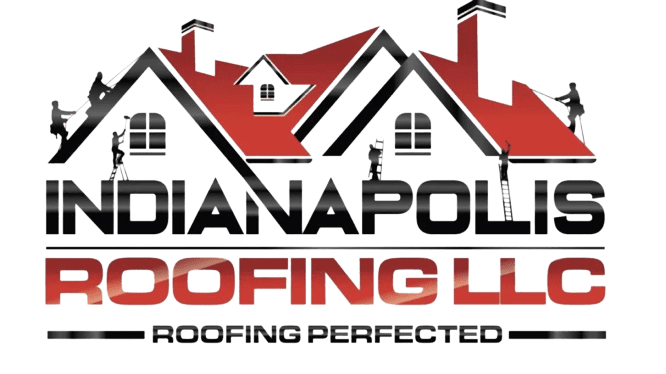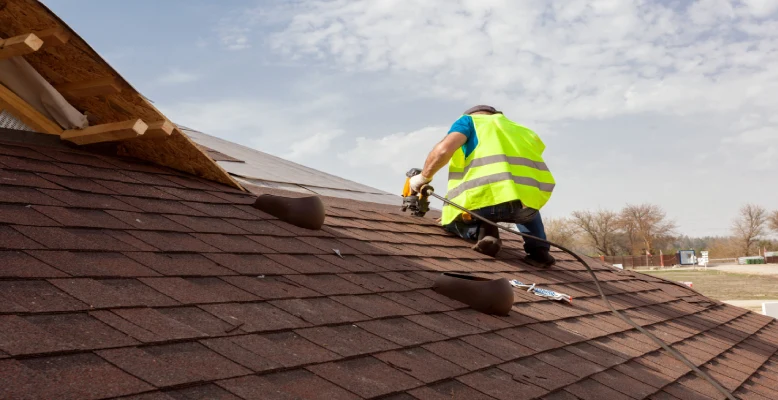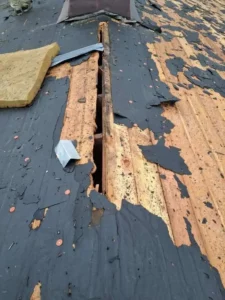When it comes to home maintenance, few tasks are as crucial as caring for your roof. Yet, amidst the wealth of information available, numerous myths and misconceptions about roof maintenance persist. In this blog post, we’ll debunk 8 common myths surrounding roof care and reveal the truth behind them. By dispelling these myths, you can ensure your roof remains in optimal condition, protecting your home and family for years to come.
Table of Contents
ToggleMyth 1: Roof Maintenance Is Only Necessary After a Leak Occurs
Truth: Regular maintenance is key to preventing costly repairs.
While it’s tempting to postpone roof maintenance until a leak becomes evident, waiting for such a sign can lead to extensive hail damage. Regular inspections and upkeep are essential for identifying and addressing minor issues before they escalate into major problems. By proactively maintaining your roof, you can save money in the long run and prolong its lifespan.
Myth 2: DIY Roof Repairs Are as Effective as Professional Services
Truth: Professional roofers possess the expertise and tools for lasting solutions.
While DIY projects can be rewarding, roof repairs are best left to professionals. Experienced roofers have the necessary training and equipment to address issues safely and effectively. Their work not only ensures your safety but also provides lasting solutions that DIY repairs often fail to deliver. Investing in professional services guarantees quality workmanship and peace of mind.
Myth 3: Roof Maintenance Is Only Essential for Older Homes
Truth: All roofs, regardless of age, require regular maintenance.
Whether your home is brand new or decades old, regular roof maintenance is imperative. Even newly constructed roofs can develop issues due to weather exposure and other factors. By scheduling routine inspections and maintenance, you can detect problems early on and prevent them from escalating. Consistent care will help preserve the integrity of your roof, regardless of its age.
Myth 4: Roof Inspections Are Costly and Time-Consuming
Truth: Regular inspections are a worthwhile investment in your home’s longevity.
While some may view roof inspections as an unnecessary expense, they are a valuable investment in your home’s well-being. Professional inspections are relatively affordable compared to the potential costs of extensive repairs resulting from neglected issues. By prioritizing regular inspections, you can catch problems early, maintain your roof’s condition, and ultimately save money in the long term.
Myth 5: All Roofing Materials Require the Same Level of Maintenance
Truth: Different materials have unique maintenance needs.
Not all roofing materials are created equal, and each type requires specific care to ensure longevity. Whether you have asphalt shingles, metal roofing, or clay tiles, understanding the maintenance requirements of your specific material is crucial. By tailoring your maintenance approach to your roof’s material, you can maximize its lifespan and performance. Consulting with a professional roofer can help you develop a maintenance plan tailored to your roof’s needs.
Myth 6: Roof Maintenance Can Be Delayed During Mild Weather
Truth: Weather conditions impact your roof year-round.
While severe weather can take a toll on your roof, mild conditions also pose risks. Even during periods of calm weather, factors like UV exposure, humidity, and debris buildup can affect your roof’s condition. Regular maintenance throughout the year is essential for addressing these issues and ensuring your roof remains structurally sound. By maintaining a consistent maintenance schedule, you can protect your roof from weather-related damage year-round.
Myth 7: Roof Cleaning Damages Shingles and Decreases Lifespan
Truth: Proper cleaning methods can extend your roof’s lifespan.
Contrary to popular belief, regular roof cleaning can actually prolong the life of your shingles and improve curb appeal. However, it’s essential to use gentle cleaning methods recommended by professionals to avoid damaging the roofing material. By removing debris, algae, and moss buildup through regular cleaning, you can prevent premature deterioration and enhance the overall appearance of your roof.
Myth 8: Roof Maintenance Is Optional for Rental Properties
Truth: Maintaining rental property roofs is a landlord’s responsibility.
As a landlord, ensuring the upkeep of your rental property’s roof is not optional – it’s a legal obligation. Neglecting roof maintenance can lead to tenant dissatisfaction, property devaluation, and even legal liabilities in case of damage or injury. By prioritizing regular inspections and repairs for rental property roofs, you demonstrate your commitment to providing a safe and habitable living environment for tenants.
Final Thoughts
Dispelling common myths about roof maintenance is essential for preserving the integrity of your home and safeguarding your investment. By understanding the truth behind these 8 myths and implementing proactive maintenance measures, you can ensure that your roof remains in top condition for years to come. Regular inspections, professional services, tailored maintenance approaches, and year-round care are key elements of an effective roof maintenance strategy. Don’t let misconceptions compromise the health of your roof – prioritize regular maintenance and enjoy a secure and durable shelter for your family.
Frequently Asked Questions (FAQs) About Roof Maintenance
Here are some common questions and answers to help you better understand the importance of roof maintenance and how to care for your roof effectively:
Q: How often should I schedule roof inspections?
A: It is recommended to have your roof inspected at least once a year, preferably in the spring or fall. Additionally, after severe weather events such as storms or heavy snowfall, it’s advisable to have your roof inspected for any damage.
Q: What are the signs that indicate my roof needs maintenance?
A: Signs that your roof may require maintenance include missing or damaged shingles, water stains on ceilings or walls, clogged gutters, sagging areas on the roof, and an increase in energy bills due to poor insulation.
Q: Can I perform roof maintenance tasks myself?
A: While some basic maintenance tasks like cleaning gutters or removing debris can be done by homeowners, it’s best to leave more complex maintenance and repairs to professional roofers. DIY repairs can be dangerous and may not address the root cause of the issue effectively.
Q: How can I extend the lifespan of my roof?
A: To extend your roof’s lifespan, ensure regular inspections and maintenance, keep gutters clean to prevent water damage, address any issues promptly, and consider investing in professional roof cleaning and maintenance services.
Q: Do different roofing materials require different maintenance approaches?
A: Yes, different roofing materials have unique maintenance requirements. For example, asphalt shingles may need periodic replacement, while metal roofs require inspection for rust and corrosion. Understanding your roof’s material will help you tailor your maintenance plan accordingly.
Q: Is roof maintenance necessary for new homes?
A: Yes, even new homes require regular roof maintenance to ensure longevity and prevent potential issues. Weather exposure and other factors can impact a new roof, making inspections and upkeep essential for its performance.
Q: How can I find a reliable roofing contractor for maintenance services?
A: When looking for a roofing contractor, seek recommendations from friends or family, check online reviews, verify licensing and insurance, and request quotes from multiple contractors. Choose a reputable contractor with experience in roof maintenance.
Q: What are the benefits of regular roof maintenance?
A: Regular roof maintenance offers various benefits, including prolonging the lifespan of your roof, preventing costly repairs, maintaining your home’s value, enhancing energy efficiency, and ensuring your family’s safety and comfort.
By addressing these FAQs and understanding the importance of roof maintenance, you can take proactive steps to care for your roof effectively and protect your home for years to come. If you have specific concerns or require professional assistance, don’t hesitate to reach out to a qualified roofing contractor for guidance and support.






